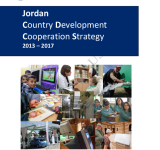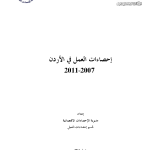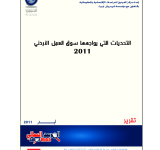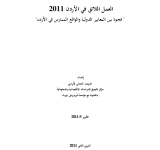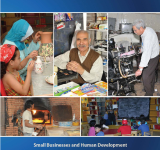The tourism sector assessment report examines critical questions related to Jordan's best opportunity areas for tourism development growth that will result in increasing tourism receipts;; private-sector investment in tourism;; and tourism-related employment. The report identifies global trends;; best practices;; and benchmarks shaping tourism demand and competitiveness. It also suggests approaches for expanding tourism in key Jordan governorates and secondary destination in ways that benefit local communities. According to the assessment;; Jordan is well-positioned to move from a regional;; multi-country tourist destination to a stand-alone destination with a portfolio of tourism products with year-round appeal for foreign and domestic visitors;; and this will require a long-term commitment from both public and private stakeholders. It suggests collaboration between Jordan's government and private sector;; localized and inclusive economic development implementation strategies and increase in the supply of skilled tourism workforce professionals.
workforce
Defining the goal as improved prosperity;; accountability and equality for a stable;; democratic Jordan;; the strategy report highlights a long-standing partnership between Jordan and the United States. Amidst a number of challenges;; Jordan continues to play a strategic ally in the region and therefore;; the report stresses the importance of assisting Jordan in carrying out its stated commitment to broad-based political and economic reforms. The three development objectives are 1. Broad-based;; inclusive economic development accelerated;; 2. Democratic accountability strengthened;; and 3. Essential services to the public improved;; with a special development objective of gender equality and female empowerment enhanced. According to the report;; the key theme of the strategy is complementing support for Jordanian-led structural reform with grassroots activities of more visible and more directly “felt” people-level impact. The development objectives find specific areas of focus that need the USAID investments and support.
يقدم هذا التقرير مجموعة من المؤشرات على شكل أرقام ونسب مئوية للقوى العاملة وأبرز الخصائص التعليمية والنشاط الاقتصادي والفئات العمرية والحالة العملية والمهنية ومستوى الرواتب والأجور النقدية المدفوعة وحجم التوظيف وغيرها. وكما يتضمن التقرير مجموعة من الجداول التفصيلية والأشكال البيانية لأهم المؤشرات للفترة الزمنية 2007-2011 وهذا بالاضافة الى كيفية احتساب أهم المؤشرات حسب تعاريف منظمة العمل الدولية.
يأتي هذا التقرير متزامناً مع الأول من أيار يوم العمال العالمي. ويتناول هذا التقرير أبرز الاختلافات التي يعاني منها سوق العمل الأردني;; وابرز الانتهاكات التي تتعرض لها قطاعات واسعة من العاملين في الاردن;; إلى جانب التحديات التي يواجهها الاقتصاد الاردني .
إن هذا التقرير يحليل واقع تطبيق معايير العمل اللائق في الأردن على مستويين;; يتمثل المستوى الاول في فحص التشريعات العمالية الأردنية المتمثلة في قانون العمل الاردني وقانون الضمان الاجتماعي وغيرها من الانظمة والتعليمات والقرارت ذات العلاقة بالعمل. أما المستوى الثاني من التحليل فيتمثل في فحص واقع التطبيق الفعلي لمعايير العمل اللائق سواء كانت واردة في التشريعات الاردنية ذات العلاقة أم لا. كما قدم التقرير مجموعة من التوصيات لتحسين واقع العمل الممارس في الاردن .
This report explores the role of Small and Medium-Enterprises (SME);; as an agent for sustainable human development in Jordan. It analyzes SMEs and their contribution to human development using fours key central pillars of human development;; namely: economic growth that is equitable and pro-poor;; social progress;; participation and empowerment through micro finance;; and environmental sustainability. The report analyses the link between SMEs and empowerment or lack thereof;; with a specific focus on the two issues of employment;; as a tool for empowerment;; and the capacity of SMEs to enhance the position of women within the workforce and home. The report findings were based on extensive research;; a survey of 1;;500 firms and focus groups discussions conducted across the governorates of Jordan. The report proposed general recommendations in terms of institutional coordination;; exports;; cluster groups;; quality standard;; government monitoring;; tax law;; local development;; youth empowerment and the increase of minimum wage.

